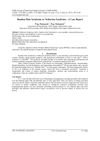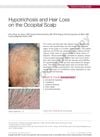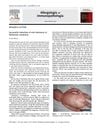 June 2011 in “The Journal for Nurse Practitioners”
June 2011 in “The Journal for Nurse Practitioners” Up to half of adult women may experience hair loss, and doctors should use medical history, exams, and tests to find the cause and treat it.
 5 citations,
September 2002 in “Archives of Dermatology”
5 citations,
September 2002 in “Archives of Dermatology” Dermatologists diagnose and manage melanoma more effectively than general practitioners.
 June 2023 in “International journal of pharmaceutical quality assurance”
June 2023 in “International journal of pharmaceutical quality assurance” Videodermoscopy is effective for diagnosing different types of non-scarring hair loss.
 April 2017 in “IOSR journal of dental and medical sciences”
April 2017 in “IOSR journal of dental and medical sciences” Netherton Syndrome is a non-treatable genetic disorder in children causing skin, hair, and allergy issues.
 December 1920 in “The Lancet”
December 1920 in “The Lancet” The document discusses various public health initiatives and societal issues, emphasizing early intervention and support.
January 2022 in “Consultant”  3 citations,
January 2020 in “Acta Dermato Venereologica”
3 citations,
January 2020 in “Acta Dermato Venereologica” Netherton Syndrome can cause severe skin lesions in rare cases.
A hair growth ointment improved hair length in a family with a genetic hair growth condition.
 42 citations,
January 2007 in “Pediatric dermatology”
42 citations,
January 2007 in “Pediatric dermatology” Low-potency steroids can cause serious side effects in people with skin conditions like Netherton syndrome.
 January 2024 in “JAAD case reports”
January 2024 in “JAAD case reports” Netherton syndrome can cause severe and chronic vulvovaginal symptoms that may improve with continuous oral contraceptives.
 September 2023 in “Cutis”
September 2023 in “Cutis” A baby girl has a hair disorder called monilethrix, causing fragile hair that may improve over time.
11 citations,
December 2017 in “Orphanet Journal of Rare Diseases” A new mutation in the ST14 gene broadens the understanding of ichthyosis-hypotrichosis syndrome.
 5 citations,
February 2019 in “The New England Journal of Medicine”
5 citations,
February 2019 in “The New England Journal of Medicine” Certain mutations in the PADI3 gene may increase the risk of developing a type of scarring hair loss common in women of African descent.
3 citations,
September 1994 in “Indian Journal of Dermatology, Venereology and Leprology” Hair loss in women was often caused by stress, illness, childbirth, or low hemoglobin, with most cases being telogen effluvium.
9 citations,
December 2015 in “Journal of Dermatological Case Reports” Narrowband UVB therapy significantly improved a child's rare skin condition.
 4 citations,
August 2016 in “JEADV. Journal of the European Academy of Dermatology and Venereology/Journal of the European Academy of Dermatology and Venereology”
4 citations,
August 2016 in “JEADV. Journal of the European Academy of Dermatology and Venereology/Journal of the European Academy of Dermatology and Venereology” Using cetirizine on the skin and taking vitamin D can help increase hair growth in children with hair loss from ectodermal dysplasia.
 29 citations,
January 2007 in “American Journal of Clinical Dermatology”
29 citations,
January 2007 in “American Journal of Clinical Dermatology” Eyebrow loss has many causes and requires accurate diagnosis for proper treatment.
 52 citations,
June 1981 in “International Journal of Dermatology”
52 citations,
June 1981 in “International Journal of Dermatology” Oral retinoids are effective for severe skin conditions but require careful use due to side effects.
 September 2003 in “Current Paediatrics”
September 2003 in “Current Paediatrics” The document concludes that accurate diagnosis and understanding the type of hair disorder are crucial for treating hair loss in children.
 52 citations,
October 2012 in “Journal of Dermatological Science”
52 citations,
October 2012 in “Journal of Dermatological Science” The document concludes that mouse models are crucial for studying hair biology and that all mutant mice may have hair growth abnormalities that require detailed analysis to identify.
 1 citations,
February 2013 in “InTech eBooks”
1 citations,
February 2013 in “InTech eBooks” Genetic mutations cause various hair diseases, and whole genome sequencing may reveal more about these conditions.
 109 citations,
May 2011 in “Dermatologic Therapy”
109 citations,
May 2011 in “Dermatologic Therapy” Alopecia areata is a type of hair loss that can lead to complete baldness, often associated with other autoimmune conditions, and half of the cases may see hair return within a year.
 11 citations,
October 2011 in “Allergologia et immunopathologia”
11 citations,
October 2011 in “Allergologia et immunopathologia” A girl with Netherton syndrome was able to eat wheat without allergies after a special treatment.
 January 1982 in “Journal of The American Academy of Dermatology”
January 1982 in “Journal of The American Academy of Dermatology” Experts discussed treatments for skin conditions in children, emphasizing hydration, cautious medication use, and early intervention for infections.
 38 citations,
June 2003 in “Journal of Investigative Dermatology Symposium Proceedings”
38 citations,
June 2003 in “Journal of Investigative Dermatology Symposium Proceedings” Accurate clinical, histological, and genetic methods are key for understanding and treating hair disorders.
 36 citations,
January 2012 in “International Journal of Trichology”
36 citations,
January 2012 in “International Journal of Trichology” Losing eyelashes or eyebrows can be a sign of many different health problems and needs a careful approach to treat effectively.
September 2012 in “Annals of saudi medicine/Annals of Saudi medicine” The twins' condition is unique and doesn't match any known syndromes.
 44 citations,
July 2005 in “Aesthetic Plastic Surgery”
44 citations,
July 2005 in “Aesthetic Plastic Surgery” Hair transplantation successfully treated a woman's hair loss caused by a tight ponytail.
 1 citations,
June 2010 in “Expert Review of Dermatology”
1 citations,
June 2010 in “Expert Review of Dermatology” Covers common skin issues in kids, their diagnosis, treatment, and need for specialist care.
 25 citations,
August 2016 in “Journal of Cosmetic Dermatology”
25 citations,
August 2016 in “Journal of Cosmetic Dermatology” The marine complex supplement significantly improved hair growth in men with thinning hair without adverse effects.
























